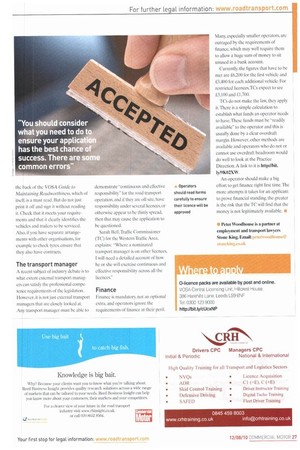Making sense of applications
Page 26

Page 27

If you've noticed an error in this article please click here to report it so we can fix it.
Getting an 0-licence application right first time can save a lot of hassle in the long run.
Words: Peter Woodhouse ALL operators will have had to apply for an operator's licence when they started trading. Most operators will make further applications to reflect their changing business needs. Such an application might be to add a new transport manager. or a new operating centre to the licence.
Ticking the right boxes As operators are well aware, nothing moves in transport without a form being I illed in. sometimes several forms. Operators often tell me of their irritation at delays in the application system. However, the single biggest reason for an application getting delayed or rejected is that the operator does not complete the form properly or fails to include a required document. Operators need to read the forms carefully. For example. section 18 of form GV79 (application for a licence) clearly lists the required attachments. Don't ignore it.
To appreciate the significance of these, an operator has to realise that when the application gets to VOSA in Leeds, it will sit in a pile, patiently waiting its turn. When it gets to the top of the pile, it's like a first interview, there is one chance to impress If something is missing, then the operator is notified in writing, but the application goes to the bottom of the pile and has to work its way up again. If Leeds are several weeks behind, that might mean a simple application takes two months to process.
Applicants must therefore check the form is filled in correctly and the documents are attached. You should consider what you need to do to ensure your application has the best chance of success.There are some common errors, Do you own the land?
One area that is sometimes treated more lightly than it should is demonstrating that the operating centre is suitable and available for use as such. It is important to get this right because the consequences of obtaining an 0-licence for an operating centre from which the operator is suddenly evicted are likely to be serious If the operator does not own the centre, then it will need written authorisation from the landlord.This caused operator David Holloway some trouble in a 2004 case. The proposed centre was on unregistered land and the operator could not find anyone to give permission. It was public land, but enquiries showed that it did not belong to the county council, the district council, the parish council or a local trust.The Transport Tribunal said that permission needed to be sought from the Crown. Unfortunately, it did not give any suggestions as to precisely from whom such permission should be sought — and operators should not expect a quick response from a direct application to Buckingham Palace Maintenance contracts lithe operator contracts out its maintenance, then signed maintenance agreements need to be included. A model contract can he found towards the hack of the VOSA Guide to Maintaining Roadworthiness. which of itself, is a must read. But do not just print it off and sign it without reading it. Check that it meets your requirements and that it clearly identifies the vehicles and trailers to be serviced. Also, if you have separate arrangements with other organisations, for example to check tyres. ensure that they also have contracts.
The transport manager
A recent subject of industry debate is to what extent external transport managers can satisfy the professional competence requirements of the legislation. However, it is not just external transport managers that are closely looked at. Any transport manager must be able to demonstrate "continuous and effective responsibility" for the road transport operation. and if they are off-site, have responsibility under several licences, or otherwise appear to be thinly spread. then that may cause the application to be questioned.
Sarah Bell. Traffic Commissioner (TC) for the Western Traffic Area, explains: "Where a nominated transport manager is on other licences. I will need a detailed account of how he or she will exercise continuous and effective responsibility across all the licences."
Finance
Finance is mandatory, not an optional extra, and operators ignore the requirements of finance at their peril. Many, especially smaller operators. are outraged by the requirements of finance, which may well require them to allow a huge sum of money to sit unused in a bank account.
Currently the figures that have to be met are £6200 for the first vehicle and £3,400 for each additional vehicle. For restricted licences.TCs expect to see £3,100 and £1,700.
TCs do not make the law, they apply it.There is a simple calculation to establish what funds an operator needs to have. These funds must be "readily available" to the operator and this is usually done by a clear overdraft margin. However, other methods are available and operators who do not or cannot use overdraft headroom would do well to look at the Practice Direction. A link to it is http://bit. ly19K02XW.
An operator should make a big effort to get finance right first time. The more attempts it takes for an applicant to prove financial standing, the greater is the risk that the TC will find that the money is not legitimately available. •








































































































































